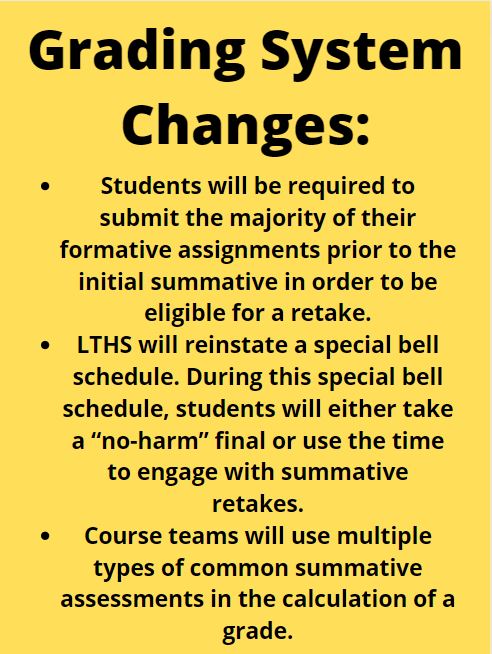Grading system updates combat retake cycles
Ensures intended goal of using retakes to promote learning
February 17, 2022
In the final weeks of first semester, Katelyn Sommerfeld ’22 frequently spent lunch periods in the Testing Center taking retakes, she said. Preparing for retakes on top of regular tests and classwork meant that her weekly workload doubled. This led her to prioritize retake preparation knowing that formative assignments did not count towards her final grade and summatives could be retaken at a later date.
“I fell into a spiral of retakes because I would be too busy studying for the retake [to] learn what we were currently learning,” Sommerfeld said. “I always felt behind.”
Sommerfeld was not alone. Many students fell into a retake cycle throughout the previous semester, due to the additional work students needed to complete after the summative and before the retake, Curriculum Director Scott Eggerding said.
“For some students, the retake cycle was initiated because they didn’t put themselves in position to do well the first time that the summative assessment was administered, because they knew that they would be able to fall back on a retake later on in the semester,” Principal Jennifer Tyrrell said.
In efforts to combat the retake cycles many students faced, the administration implemented changes to the grading system, including requiring students to complete the majority of their formative assignments prior to the summative assessment in order to be eligible for a retake.
“Retakes are intended to provide students, who engaged in the initial learning but did not demonstrate mastery by the summative assessment, another opportunity to demonstrate their learning,” Coordinator of Assessment and Research Katherine Smith said. “The Grading Implementation Committee wanted to ensure students were engaging in the initial learning, which is why the policy for second semester requires students to complete a majority of their formative work before the initial summative in order to be eligible for a retake.”
The administration has solicited feedback on the grading system from staff, students and families both through surveys and student focus groups throughout first semester, Tyrrell said. Moving forward, administrators will have an additional opportunity to receive feedback with the implementation of the new Strategic Planning Committee.
LT will also reinstate a special bell schedule at the end of the semester, Eggerding said. This class time will be used for a “no-harm” final or will provide an opportunity for students to retake summative assessments. Some teachers were giving summatives at the very end of the semester and did not allow students to retake, so the addition of a special bell schedule will provide a time for those retakes. Teachers will also be encouraged to include more frequent and variable summative assignments into the calculation of the final grade. In addition to traditional tests, presentations, quizzes, lab reports and essays will be included as summative grades.
The intention of the initial grading system change in the fall 2020 semester was to include progress marks and one grading scale, Smith said. The Grading Implementation Team—made up of teachers, a case manager, an inclusion facilitator, counselors and administrators—will continue to meet throughout the course of the semester to discuss grading and work to implement these practices.
“I like that they [made this update],” Sommerfeld said. “It is definitely motivating for me to get [formative] things done. I hope it prevents me from falling into a retake cycle again.”





















![Movie poster for '[Rec]" (2007).](https://www.lionnewspaper.com/wp-content/uploads/2023/04/rec-640x900.jpg)



